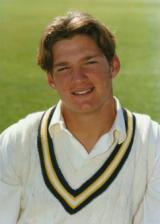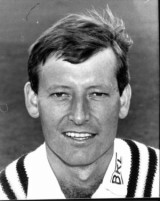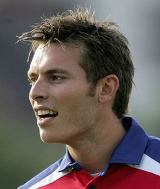Generation game
More sons of Test players are following their fathers into the Test arena. The Wisden Cricketer investigates a trend that is led by England
|
|

|
"I've a lad at home that will make up for this one day."
Fred Tate's words after being last out in the gripping Old Trafford Test of 1902 live on more than a century later, not only because of his role in an Ashes series unmatched for drama until 2005 but as a prediction born of despair that came resoundingly true. The lad at home, seven-year-old Maurice, more than made up for it. His 155 wickets in 39 Tests made him the link man between SF Barnes and Alec Bedser in England's holy trinity of fast-medium giants. He also founded a tradition that prospers to this day, of fathers following sons into the England team.
This summer saw Ryan Sidebottom, son of a Test player, Arnie, bowling alongside Chris Tremlett, whose grandfather Maurice played for England. Both benefited to some extent from the absence of Simon Jones, son of a Test player, Jeff, and knew that next in line was Stuart Broad, yet another dynast. Of the 11 Englishmen who have followed their fathers into Test cricket, five - the others are Mark Butcher, Dean Headley and Alec Stewart - have played during the last decade. Given a suitably sophisticated time machine, a Fathers v Sons match with 22 England cricketers would now be possible, although the dads would have to persuade one of their number to keep wicket. Maurice Tate would be the best bowler on view but the seniors would have the best batsmen, Len Hutton and Colin Cowdrey.
We should hardly be surprised by the trend. Sons have ever been wont to follow their father's occupation, particularly when, as with top-class sport, only limited numbers have the innate physical abilities necessary. The England footballer Frank Lampard, Wales rugby three-quarter Tom Shanklin, and the American baseball player Barry Bonds, who recently broke the all-time home-run record, are all doing what dad did before them.
As Alan Butcher, cricket manager at Surrey, points out: "You could describe it as a process of osmosis. My sons came to watch me play and there was always talk about cricket, or cricket on the television. They simply absorbed it." His son, Mark, remembers it the same way. But such an inheritance is not always an advantage. You need not accept Peter May's brisk response when asked whether he regretted having only daughters and not a son who might have followed him - "No, they're never as good" - to understand that some names simply impose too heavy a weight.
Stanley Matthews Jr, an exceptional footballer, chose to play tennis. John Bradman changed his surname by deed poll, although he later reverted. And Liam Botham is remembered by Hampshire's director of cricket, Tim Tremlett, as potentially "a very good cricketer indeed". On his first-class debut for Hampshire, two days after his 19th birthday, Botham took five Middlesex wickets for 67, starting with Mike Gatting. But he opted instead for a rugby career. Still, the recent profusion of English second-generation Test players is hard to explain. It cannot be put down to the proliferation in Test matches. England have capped 94 new players in the 17 years since Alec Stewart, first of the recent five, made his debut in 1990. This works out as five-and-a-half new caps per year - very much in line with the trend since the Second World War.
One possible explanation is a narrowing of cricket's social base, meaning that those with a family predisposition towards the game make up a higher proportion of those coming into it. Alan Butcher thinks there may be something in this: "I think there are people in state schools who miss out where they once did not, something that the Chance to Shine programme is intended to address." And he points to the benefits that Mark, and other current players like David Sales, Ali Brown and Scott Newman, had from attending Cumnor House prep school, where cricket was emphasised. Tim Tremlett is less convinced.
Leicestershire's Jeremy Snape, who has seen it all during a long career, and as a psychologist thought rather more deeply about it than most, believes that respects in which the game has got harder may favour the dynasts: "There are more barriers now and those who have some idea what to expect may be better able to cope. They'll have some idea about the high profile of elite sportsmen, the politics, agents and potential distractions. If you haven't got that background, it can come as a terrible shock." Or it may just be a statistical freak.
|
|
 
|
Tremlett - uniquely among Englishmen both son and father of a Test cricketer - agrees that a famous father can be a burden: "Liam Botham would have had an enormously hard act to follow. Any young player following his father has to cope with people saying 'You're not as good as he was'.
It probably helped that there was a fair gap between dad's career and my own." He was only four when his father, Maurice, who won three caps in the West Indies in 1947-48, played his last game for Somerset. Tremlett remembers: "He encouraged me to play all sports, not just cricket, and as it happens, when I played my first match at school, it was my mother rather than my father who took me. Once I did decide it was what I wanted to do, at 16, he was very supportive."
Tremlett followed a similar strategy with his son Chris, although his coaching role at Hampshire has meant a much closer involvement once Chris' professional career started. As an England B player who links two Test bowlers, Tremlett reflects that both his father and son had the edge on him in height and pace. "I get asked whether I'm Chris's dad nowadays, rather than him being asked if he's my son."
Alan and Mark Butcher even played against each other, when Mark made his Sunday League debut for Surrey against Glamorgan as a teenager in 1991. Alan, who was captaining Glamorgan, remembers: "We won but he came in at the end, batted very well and nearly won it for them, so it was a good day all round." For Mark, the example set by his father has been important: "One of the things that has driven me is wanting to be as good as, perhaps better than, him." But some forms of emulation are less positive. One of the benefits of Ryan Sidebottom's England recall has been that he and Arnie escaped the fate of being the only father-and-son one-Test wonders. And Simon Jones' continuing injury misfortunes have an unhappy echo of Jeff's truncated career.
The one thing nobody is suggesting is that simply being the son of a Test player will take you very far. As Alan Butcher says: "It comes down to whether you're good enough, not who your father is." But it is a fair chance that there are current or recent England players with a lad at home who will make us all take notice one day.
Huw Richards writes on cricket for the International Herald Tribune
